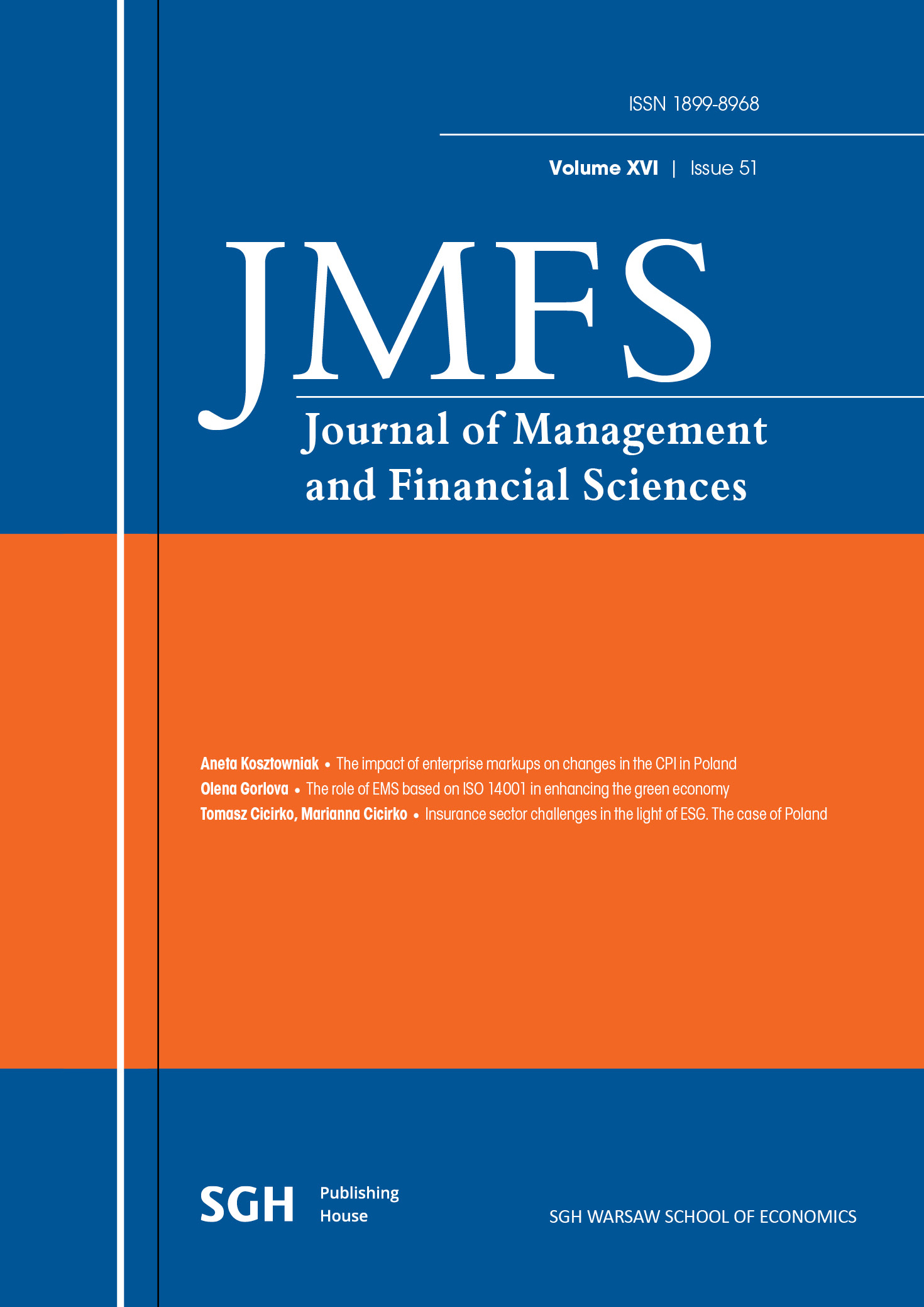The role of EMS based on ISO 14001 in enhancing the green economy
Main Article Content
Abstract
The concept of green economy plays an important role in economic development programmes around the world. It is also part of the economic policy and government regulations in Poland. The overall goal of the green economy, which is to ensure sustainable development of the country’s economy, impacts the strategy and policy of each company. ISO 14001 is generally considered the main tool for addressing environmental issues in the management of an enterprise. The standard provides a proven and reliable foundation for the environmental management system (EMS). However, the relationship between the ISO 14001‑based EMS and the economic aspect of environmental protection is still poorly studied. The study addresses the gap.
The article explores the relationship between the prevalence of ISO 14001‑based EMS and the economic aspect of environmental protection in the green economy of Poland. The study covers the period from 2000 to 2022. Correlation analyses of the data obtained from the ISO survey and statistical indicators of the green economy of Statistics Poland (GUS) were used.
The results of the study show the impact of the prevalence level of ISO 14001‑based EMS on the amount of capital expenditures for environmental protection, as well as on the amount of energy and resources taxes paid by the business sector. Furthermore, the relationship between the growth dynamics of the number of certified EMS and QMS was analyzed. The implementation of ISO 9001 was established as a prerequisite for the implementation of ISO 14001, but it is not the only factor that influences this decision. The direction for further research is proposed.
Downloads
Article Details

This work is licensed under a Creative Commons Attribution 4.0 International License.
References
Andersen, M. M. (2017). The Sustainable Development Goals – Pathways to Eco-innovation and a Global Green Economy? Globelics Conference 2016.
Bernardo, M., Simon, A., Tarí, J. J., Molina-Azorín, J. F. (2015). Benefits of management systems integration: a literature review. Journal of Cleaner Production, 94, pp. 260–267, http://dx.doi.org/10.1016/j.jclepro.2015.01.075
Bruel, A., Kronenberg, J., Troussier, N., Guillaume, B. (2019). Linking Industrial Ecology and Ecological Economics: A Theoretical and Empirical Foundation for the Circular Economy. Journal of Industrial Ecology, 23 (1), pp. 12–21, https://doi.org/https://doi.org/10.1111/jiec.12745
Cato, M. S. (2009). Green economics: An introduction to theory, policy and practice. Earthscan.
D’Amato, D., Korhonen, J. (2021). Integrating the green economy, circular economy and bioeconomy in a strategic sustainability framework. Ecological Economics, 188, p. 107143. https://doi.org/https://doi.org/10.1016/j.ecolecon.2021.107143
Fernandes, D., Machado, C. (2022). Chapter 9 – Connecting ecological economics, green management, sustainable development, and circular economy: Corporate social responsibility as the synthetic vector. In C. Machado, J. P. Davim (Eds.), Green Production Engineering and Management (pp. 183–236). Woodhead Publishing, https://doi.org/https://doi.org/10.1016/B978-0-12-821238-7.00001-4
GUS (2019). Ekonomiczne aspekty ochrony środowiska 2019, https://stat.gov.pl/obszary-tematyczne/srodowisko-energia/srodowisko/ekonomiczne-aspekty-ochrony-srodowiska-2019, 14,1.html
GUS (2020). Ekonomiczne aspekty ochrony środowiska 2020, https://stat.gov.pl/obszary-tematyczne/srodowisko-energia/srodowisko/ekonomiczne-aspekty-ochrony-srodowiska-2020, 14,2.html
GUS (2021). Ekonomiczne aspekty ochrony środowiska 2021, https://stat.gov.pl/obszary-tematyczne/srodowisko-energia/srodowisko/ekonomiczne-aspekty-ochrony-srodowiska-2021, 14,3.html
GUS (2022a). Ekonomiczne aspekty ochrony środowiska 2022. Tablice, https://stat.gov.pl/obszary-tematyczne/srodowisko-energia/srodowisko/ekonomiczne-aspekty-ochrony-srodowiska-2022,14,4.html
GUS (2022b). Wskaźniki zielonej gospodarki w Polsce, https://stat.gov.pl/obszary-tematyczne/srodowisko-energia/srodowisko/wskazniki-zielonej-gospodarki-w-polsce-2022,5,6.html
GUS (2023a). Ekonomiczne aspekty ochrony środowiska 2023, https://stat.gov.pl/obszary-tematyczne/srodowisko-energia/srodowisko/ekonomiczne-aspekty-ochrony-srodowiska-2023, 14,5.html
GUS (2023b). Ochrona środowiska. Archiwum. 2005–2022, https://stat.gov.pl/obszary-tematyczne/srodowisko-energia/srodowisko/ochrona-srodowiska-2023,1,24.html
International Organization for Standardization (2023a). The ISO Survey 2022, https://www.iso.org/the-iso-survey.html
International Organization for Standardization (2023b). ISO/CASCO Documents. Past Surveys. 2017–2021, https://www.iso.org/committee/54998.html?t=fe1zmUJZEtBwW44bXQaxEEhXyPBIT9cUALlPSY3kL8J4‑GrZ6jquix38wwjCPeg4&view=documents#section-isodocuments-top
Juszczak, A., Rabiega, W. (2021). Green economy – wpływ zielonej ekonomii na klimat i rozwój gospodarczy. Polski Instytut Ekonomiczny.
Kanianska, R. (2017). Green growth and green economy. Banská Bystrica, Belianum, https://www.enviroportal.sk/dokument/f/green-growth-and-green-economy
Khoshnava, S. M., Rostami, R., Zin, R. M., Štreimikienė, D., Yousefpour, A., Strielkowski, W., Mardani, A. (2019). Aligning the criteria of green economy (GE) and sustainable development goals (SDGs) to implement sustainable development. Sustainability, 11 (17), p. 4615, https://doi.org/10.3390/su11174615
Lopes, J. M., Oliveira, J. C. (2023). Problems and solutions: the sustainable development goals in the age of green economy. International Journal of Innovation and Sustainable Development, 17 (4), 410–424, https://doi.org/10.1504/IJISD.2023.133749
López‐Fresno, P., Karapetrovic, S. (2010). Implementation of an integrated management system in an airline: a case study. The TQM Journal, 22 (6), pp. 629–647, http://dx.doi.org/10.1108/17542731011085311
Mayers, K., Davis, T., Van Wassenhove, L. N. (2021). The Limits of the “Sustainable” Economy. Harvard Business Review, 16, https://hbr.org/2021/06/the-limits-of-the-sustainable-economy
Merino-Saum, A., Clement, J., Wyss, R., Baldi, M. G. (2020). Unpacking the Green Economy concept: A quantitative analysis of 140 definitions. Journal of Cleaner Production, 242, 118339, https://doi.org/https://doi.org/10.1016/j.jclepro.2019.118339
Misztal, P., Dziekański, P. (2023). Green Economy and Waste Management as Determinants of Modeling Green Capital of Districts in Poland in 2010–2020. International Journal of Environmental Research and Public Health, 20 (3), 2112, https://doi.org/10.3390/ijerph20032112
Newton, A. C., Cantarello, E. (2014). An introduction to the green economy. Earthscan, Abingdon, UK.
Ofori, E. K., Li, J., Radmehr, R., Zhang, J., Shayanmehr, S. (2023). Environmental consequences of ISO 14001 in European economies amidst structural change and technology innovation: Insights from green governance dynamism. Journal of Cleaner Production, 411, p. 137301, https://doi.org/https://doi.org/10.1016/j.jclepro.2023.137301
Ronalter, L. M., Bernardo, M., Romaní, J. M. (2023). Quality and environmental management systems as business tools to enhance ESG performance: a cross-regional empirical study. Environment, Development and Sustainability, 25 (9), pp. 9067–9109, https://doi.org/10.1007/s10668-022-02425-0
Spangenberg, J. H. (2016). The world we see shapes the world we create: how the underlying worldviews lead to different recommendations from environmental and ecological economics – the green economy example. International Journal of Sustainable Development, 19 (2), pp. 127–146, https://doi.org/10.1504/IJSD.2016.077208
Szyja, P. (2015). Zielona gospodarka w Polsce – stan obecny i perspektywy. Nierówności społeczne a wzrost gospodarczy 41 (1), 432–447, https://repozytorium.ur.edu.pl/items/8fccaedc-83c9-4b63-9c6b-3d038cc7fbe5
ten Brink, P., Mazza, L., Badura, T., Kettunen, M., Withana S. (2012). Nature and its Role in the Transition to a Green Economy. Final Report. The Economics of Ecosystems and Biodiversity (TEEB), https://teebweb.org/publications/other/nature-role-in-green-economy/
Wagner, M. (2013). ‘Green’ Human Resource Benefits: Do they Matter as Determinants of Environmental Management System Implementation? Journal of Business Ethics, 114 (3), pp. 443–456, https://doi.org/10.1007/s10551-012-1356-9
Wagner, T. (2022). Zielone podatki z reguł wchodzą do podstawy opodatkowania VAT. Ernst & Young Polska, https://www.ey.com/pl_pl/tax/zielone-podatki-podstawa-opodatkowania-vat
